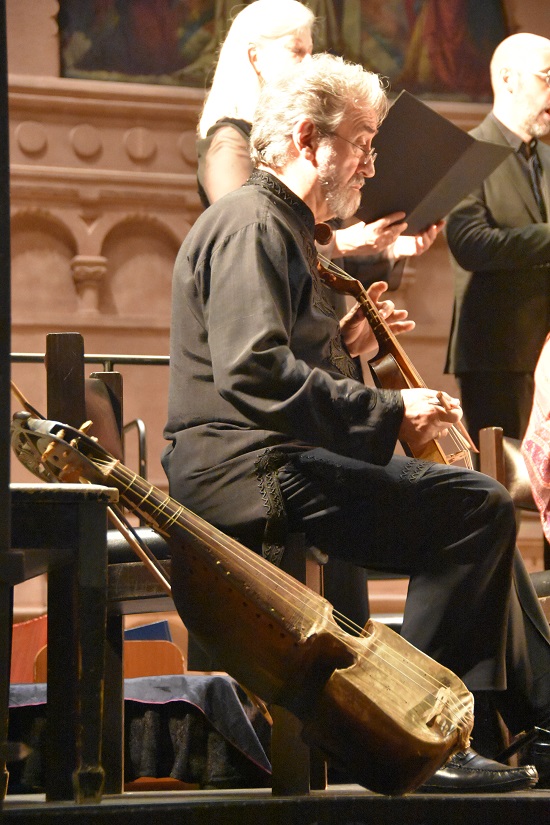Savall and Hespèrion XXI pray for Catalonia in exquisite concert

Jordi Savall (foreground) and soprano María Cristina Kiehr. Photo: Classical Movements.
Life spirals through cycles, seeming to come back to its starting place. Jordi Savall, the revered Catalan viol player, recorded the music of the Llibre Vermell of Montserrat in the 1970s, in the early years of his early music ensemble, Hespèrion XX. Four decades later, Savall and the new century’s version of the group, Hespèrion XXI, performed the same program.
Presented on Friday by Classical Movements at St. Mark’s Episcopal Church on Capitol Hill, the concert marked the feast day of Our Lady of Montserrat, patroness of the beleaguered region of Catalonia.
The “red book” is a 14th-century codex from the Abbey of Santa Maria de Montserrat in the mountains of Catalonia. The ten pieces in this concert were offered for the use of pilgrims, who came to venerate the Black Virgin enshrined there. Savall conceived the program, reproduced more or less faithfully from his earlier recording, as a chiasmus.
The opening piece, O virgo splendens, began as a processional chant, the three male singers moving from the back of the church to the performing platform while singing in unison. The women joined them for a version in three-part canon, as specified in the manuscript. At the end of the evening, performed without intermission or intervening applause, the musicians repeated the piece in reverse order, going from canon to unison while recessing.
Arrangements of other pieces in the concert were also mirror forms, like Laudemus virginem and Splendens ceptigera. The musicians sang both pieces first in unison, followed by a two-part and then three-part canon, reversing that order back to unison in each case.
Bells punctuated the evening, signaling the semi-liturgical nature of this music, but Savall’s rhythmically animated arrangements also paid tribute to the popular side of the Llibre Vermell. Except for a few transitional solos, Savall kept himself in the background, sometimes conducting with a free hand or his bow.
At the center of the evening’s arch was the exquisite Polorum regina, a lilting tune in what sounds like a major scale over a drone. In this time-stopping piece and others, soprano María Cristina Kiehr was unparalleled for the ardent, unforced, maternal warmth of her voice. For a serene stretch including this piece and those around it, Savall reduced the vocal forces of La Capella Reial de Catalunya to strictly treble voices.
On the other treble vocal parts was Savall’s daughter, Arianna, and the mezzo-soprano Vivabiancaluna Biffi. Much of the evening they played and sang simultaneously, multi-tasking that sometimes led to errors. Rhapsodic intonations on harp, recorders, rebec, and ceterina, all with the feel of improvisation, linked the pieces and added to the meditative aura.
Percussionist David Mayoral provided an endless variety of accents and rhythmic animation, often playing multiple instruments at the same time. The heavily rhythmic rendition gave the dance pieces in the collection, like Stella splendens and Los Set Gotxs, a fervent, joyful character.
While the results often sounded quite distant from the 14th century, the rhythmic patterns imposed are mostly based on the shapes of notes in the manuscript. Imperayritz de la ciutat joyosa was the only piece that sounded not quite fully formed, the intricate rhythms not jelling across the ensemble.
One new flavor added to the texture in this performance were vivid sounds from eastern instruments, including the kanun played by Hakan Güngör and the santur played by Dmittri Psonis. This concert was also a preview in some ways of this summer’s Smithsonian Folklife Festival, which will focus on the heritage of Catalonia and Armenia.
Savall, venerated as much for his humanitarian work as his musical talents, ended the evening on a political note. Facing growing calls for the independence of Catalonia, Spain has suspended the former autonomy of Savall’s natal region and pursued those who set in motion the independence movement. In response, Savall dedicated the encore of Quand ai lo mon consirat, a joyful song in Catalan from the 12th century, to the politicians of Catalonia “in prison and in exile.”

Posted Apr 29, 2018 at 8:17 am by Vanya
BRAVO
Posted May 01, 2018 at 6:39 am by Albert
Savall is one of milions of inhabitans in Catalonia in demand of freedom for the politician prisioners. Rajoy in Spain like as Erdogan in Turkey. And Europe is looking to the sky.
All the most intelligent persons and artists in Catalonia demand out of Spain the right to decide to become a independent Catalonia.
Thanks Master!